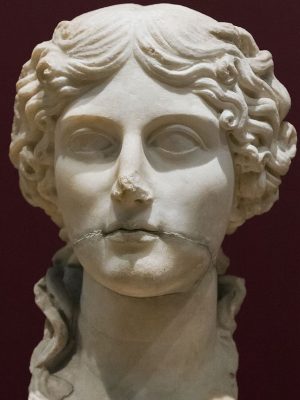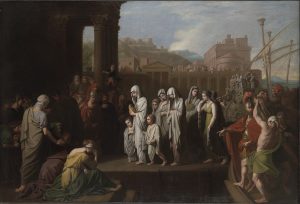Agrippina the Elder (14 BC-AD 33) was an influential figure during the conflict of succession during the reign of Emperor Tiberius. Her father, Marcus Vipsanius Agrippa, was a close friend and advisor to Augustus, the first Roman emperor. Her mother, Julia the Elder, was Augustus’ daughter. Her brothers, Lucius and Gaius Caesar were adopted by Augustus and were his heirs until their deaths in AD 2 and 4. Agrippina played a significant role in politics during her lifetime and was known for her intelligence and strong personality.
Family Background
Agrippina was born in 14 BC into a family of great power and influence. She had many siblings, three brothers—Gaius, Lucius, and Postumus Agrippa (all adopted by Augustus)—and a sister, Julia the Younger. She also had half-sisters from her father’s marriages to Pomponia Caecilia Attica and Claudia Marcella Major, namely Vipsania Agrippina, Vipsania Attica, and Vipsania Marcella.
Her mother was Augustus’ only child from his marriage to Scribonia. Agrippa was her second husband. Augustus arranged for her to marry Agrippa in 17 BC to gain more control over his friend and potential rival. Her father played a significant role in the defeat of Mark Antony and Cleopatra at the Battle of Actium in 31 BC, after which he became one of the most powerful men in Rome. Augustus rewarded him with many honors, including the tribunicia potestas (“tribunician power”), which authorized him to control the senate.
Marriage and Children
Agrippina married Germanicus Caesar, son of Nero Claudius Drusus and Antonia the Younger, around AD 5. The previous year, Germanicus was adopted by his paternal uncle, Tiberius, who was in turn adopted by Augustus. This made Germanicus and Agrippina second cousins.
The couple had nine children together:
1) Nero Julius Caesar
2) Gaius the Younger (better known as Caligula)
3) Drusus Julius Caesar
4) Tiberius Julius Caesar
5) Ignotus
6) Gaius the Elder
7) Agrippina the Younger
8) Julia Drusilla
9) Julia Livilla
Her husband traveled a lot during his military career, and Agrippina often accompanied him. In AD 12, Germanicus was made consul, then was granted command over Gaul and the forces on the Rhine the following year.
When Augustus died in AD 14, Tiberius was made princeps. Agrippina’s husband and her brothers were potential heirs to Augustus, but Tiberius was eventually named as the sole heir. While Germanicus was away administering the oath of fealty to Tiberius, there was a mutiny on the Rhine.
Agrippina brought out Gaius, their sixth child, and third son, to take him away to a safer town while the mutiny was ongoing. He was dressed in a full army outfit, including the legionary hobnailed boots (caligae in Latin). The miniature army boots he was wearing earned Gaius the nickname “Caligula” (little boots or “Bootikins”). The historian Tacitus credited her actions as having won the soldiers’ sympathy, contributing to the end of the mutiny.
To deter future mutinies, Germanicus remained in Gaul and led his soldiers against the Germanic tribes until AD 16, when Tiberius called him to return to Rome. Germanicus was very successful in his military campaigns and was popular with the troops. In AD 17, he returned to Rome a Triumphator (a general who has been awarded a triumph). However, Germanicus’ military career came to an abrupt end when he died suddenly in Antioch in AD 19, at the age of 33. The exact cause of his death is unknown, but there was much speculation at the time that his rival, Piso, poisoned him on the orders of Tiberius, who feared Germanicus’ popularity with the people.
Whether he was poisoned or not, his death was a great loss to his family and the people of Rome. When Agrippina journeyed back to Rome with his ashes, the people came out and showed their respect. The son of Tiberius, Drusus the Younger, joined the procession, but neither Tiberius nor Livia made an appearance. Germanicus’ ashes were interred at the Mausoleum of Augustus, reserved for the members of the imperial family.
Conflict of Succession
While her marriage to Germanicus united the imperial family, his death left Agrippina with no more familial ties to the emperor. She accused Tiberius of poisoning her husband, and their relationship became tense. Agrippina advocated for her sons to succeed Tiberius instead of his natural son, Drusus the Younger. She was vocal about the claim that Tiberius had Germanicus murdered to promote Drusus the Younger, Tiberius’ son, as heir.
This was around the time when Sejanus, the Praetorian Prefect, was becoming powerful in Rome. He did not get along with Drusus the Younger. While the actual reason for the feud is unknown, it ended when Drusus the Younger suddenly died of reportedly natural causes on 14 September AD 23.
The death of Drusus the Younger left Rome without a clear heir, making Agrippina’s sons the logical choice. In an effort to convince Tiberius, she presented him with the Great Cameo of France. Carved from sardonyx, this was a massive portrait that commemorates the union of the Julio-Claudian dynasty. Agrippina likely commissioned the piece herself. The work was designed to flatter Tiberius and position Agrippina’s family as his successors.
Her son, Nero, was becoming increasingly popular in the senate, partly owing to his resemblance with Germanicus. This put them in direct competition with Sejanus, who was also angling for a position of power. In order to remove her children as potential threats, Sejanus began spreading rumors about Agrippina. This caused a split in the aristocracy and gave rise to factions.
Agrippina’s Exile and Death
In AD 24, during the New Year’s Day prayer, Sejanus made the priests and magistrates add prayers for the health of Agrippina’s sons, Nero and Drusus. This angered Tiberius, and he told the Senate as such. Since several of the priests were related to Agrippina, Tiberius became suspicious of her. When she asked to remarry, he rejected her request. When Sejanus requested Livillia’s, Tiberius’ niece, hand in marriage, the same thing happened. The emperor saw it as a power grab, and he refused. If one or both of them remarried, it would jeopardize the line of succession.
Tiberius became increasingly reclusive and paranoid, torn between Sejanus–who he considered a friend and confidante–and his own family. The emperor left Rome in AD 26 and retired to Capri, an island located in the Bay of Naples. This led to Sejanus becoming the de facto ruler of Rome. Along with his allies, he accused Agrippina and her associates of treason.
Agrippina was placed under house arrest in AD 27 in her villa outside Herculaneum and then was exiled to Pandateria two years later. Nero was also exiled at the same time to Pontia, and in AD 30, Drusus was imprisoned in Rome. While in exile, Agrippina violently fought back. Tiberius ordered a centurion to flog her, and she lost an eye in the process. She remained on the island of Pandateria until she died in AD 33, either from self-imposed starvation or from the order of Tiberius.

